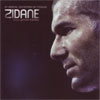 It is not a prerequisite to appreciate soccer or French star Zinedine Zidane's role in the modern game to enjoy Mogwai's work on this film's soundtrack, but Zidane the man and Zidane the film give the music context that will mean something more to fans of the game.
It is not a prerequisite to appreciate soccer or French star Zinedine Zidane's role in the modern game to enjoy Mogwai's work on this film's soundtrack, but Zidane the man and Zidane the film give the music context that will mean something more to fans of the game.
The pairing of Mogwai's typical melancholy with a sports-themed film didn't immediately make sense to me, especially after listening to the Zidane album and noting that it is entirely free of the huge, sweeping bombast that Mogwai added to the Kronos Quartet for their other recent film work, The Fountain's score. Zidane finds Mogwai at their restrained best as the band takes a central theme and works it through a number of cues that work beautifully as a stand alone album. The music is focused less on the quiet/loud dynamic that many Mogwai fans may expect, and more on the simple construction of a mood that matches the feeling that I guess many of us have about Zidane at the end of his career.
Most Americans, if they know of Zidane at all, know him more for one of the most egregiously unsportsmanlike moments ever televised than for his many years as one of soccer's brightest stars. Zidane famously capped a brilliant and storied carrer by being ejected from the final of the 2006 World Cup in overtime, mere moments after he'd nearly put France ahead for their second World Cup title on his watch. As a fan, watching Zidane end his career on an outrageous foul was heartbreaking. It certainly tainted his Golden Ball award as the best player in the 2006 tournament, but it also cast a shadow over every highlight clip, every goal, every dazzling spin through the midfield, and every fond memory of Zidane as one of the greatest players in the modern game.
Douglas Gordon and Philippe Parreno could not have anticipated Zidane's meltdown when they proposed to film a club match between Zidane's Real Madrid and Villareal in April of 2005 to create their film, Zidane: A 21st Century Portrait. The two artists had been interested in a high concept film about Zidane for years, and after convincing the French star that the time was right and the project was right, the two directors set up a 17 camera shoot to film only Zidane during a single match. The result is a film that defies expectation, but lives up to its title.
More a portrait using moving pictures than a documentary as might be expected, the film follows Zidane almost completely devoid of context from the opening kickoff through the moment he steps off the field for a single match. It's not the match of a lifetime or a game where the hearts of an entire nation are beating out of their chests--it's just another day at the office for Zinedine Zidane. It's important to understand that the film isn't about the story of the game any more than a portrait hanging on the wall is about the background of the painting. The game and all of the drama within it works as a framing device for a study of Zidane at work. Of course it's nearly impossible to watch the film without wondering what other players are doing with the ball as Zidane appears to wander around outside of the play, but the filmmakers stick to their modus operandi and offer little more than images of Zidane for an hour and a half. If all of that sounds ponderous our boring, it's because without the right context outside of the film, it most certainly would be.
Darius Khondji (the cinematographer employed often by filmmakers such as David Fincher and Jean-Pierre Jeunet) brings Zidane to life beautifully in a way that demonstrates how the world of artful photography and live sports coverage rarely converge. Meanwhile, Mogwai's score is used sparingly to highlight particularly slow moments where Zidane is dragging his shoes on the pitch or watching the action from afar. The film is often balletic and slow, but it leaves one with plenty of time to reflect.
During half time there is a wonderful collage that puts Zidane, the match, and the sport of soccer all into a broader context, and it's during this segment that the Mogwai score, the weight of Zidane's career, and the film's vision begin to congeal. An image of a child in a Zidane jersey in the midst of chaos reminds us of just how wide reaching the sport can be, and how a Frenchman of few words who kicks a ball around on nicely pruned grass on Sundays can be the kind of hero who transcends political and cultural borders. It's also here where the choice of Mogwai starts to make sense as a metatextual comment on the bittersweet role that a hero like Zidane plays in our lives. By the time the film ends with its own deeply ironic and unscripted twist, the film and soundtrack have become inseperable from my memories of Zidane through the years.
What winds up being most moving about the film is the way that the music reinforces the conflicted feelings that many of his fans (and fans of soccer in general) must have after watching that World Cup final in 2006. There's no easy way to reconcile the hundreds of Zidane highlight reels on YouTube with that single looping clip of him headbutting Italy's Materrazi with no visible provocation. Though it's hard to imagine Mogwai intending to score Zidane's entire career rather than just this film, they have in essence created the perfect theme music for such an imperfect hero.
samples:
Read More

